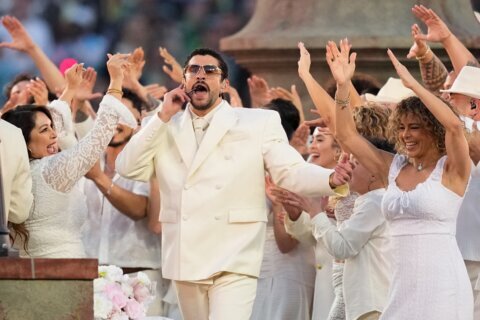WASHINGTON — Three years ago, A&E revived Alfred Hitchcock’s “Psycho” (1960) for an Emmy-nominated TV horror-drama with “Bates Motel” (2013).
Now, the network is at it again with its new series “Damien” (2016), arriving just in time for the 40th anniversary of Richard Donner’s “The Omen” (1976), which joined Roman Polanski’s “Rosemary’s Baby” (1968) and William Friedkin’s “The Exoricst” (1973) as an unholy trinity of Biblical thrillers.
This isn’t the franchise’s first resurrection. The 1976 film starring Gregory Peck and Lee Remick was such a hit that William Holden and Lee Grant came on board for “Damien: Omen II” (1978), followed by Sam Neill in “The Final Conflict” (1981), a forgettable fourth chapter “Omen IV: The Awakening” (1991) and a lackluster remake with Liev Schreiber and Julia Stiles in “The Omen” (2006).
Monday night, the trend continues with Episode 2 of “Damien,” created by Glen Mazzara, former show runner of AMC’s “The Walking Dead.” We catch up with Damien Thorn (Bradley James) years after his Harvey Stephens childhood and Jonathan Scott-Taylor adolescence, but just before Neill’s Armageddon adult. It’s now his 30th birthday — the same age Christ reportedly began his ministry.
Ignorant of his divine identity, Damien serves as a war photographer in Damascus, Syria. But during a security crackdown, he comes face-to-face with a mysterious Old Woman who jars his memory, recalling horrific childhood images as he gradually learns that he may in fact be the Antichrist.
The pilot episode features plenty of nostalgia for “Omen” fans with the return of all your old creepy favorites: the watchful ravens, the guardian Rottweilers, the crucifix knives, photographs capturing the supernatural, a protégé of Bugenhagen from the town of Megiddo and a perfectly cast Barbara Hershey (“Black Swan”) as Damien’s protector Ann Rutledge, just like the terrifying Billie Whitelaw.
Music composer Bear McCreary (“Walking Dead”) samples the chilling piano notes and demonic choir of Jerry Goldsmith’s Oscar-winning score, while Indian director Shekhar Kapur (“Elizabeth”) provides numerous flashbacks to the 1976 original, from the nanny’s shocking suicide at Damien’s birthday party to the climax of an ill-fated Gregory Peck dragging Harvey Stephens to the alter.
The pilot’s opening and closing bookends are powerful, as Adult Damien — resembling a spiky-haired Jesse Pinkman — enters a sanctuary beneath an extreme high angle looking down from the heavens. As the church doors open, he appears bathed in blurry backlight, intentionally out of focus, before approaching the alter, kneeling before the crucifix and confronting his divine adversary.
As the episode continues, Kapur takes a page from Friedkin’s “Exorcist” by taking us to the cradle of civilization — perfect for demonic awakenings of Biblical proportions — introducing a Middle Eastern cityscape where old women in shawls stare holes through our protagonist, much like they did Max Von Sydow. Even as Damien returns to New York City, a voyeuristic camera watches him — and his love interest — from afar, suggesting an eerie omniscience that escalates the dreadful mood.
But despite these effective techniques, there are already several red flags that cause concern for the series’ pacing going forward. At times, the show feels more like the “Omen” sequels with a rapidly increasing death count becoming more important than slow-burn suspense. I get the temptation, but certainly the show would be better off if it didn’t kill off characters right as they are introduced.
The first episode alone features two violent deaths when one would have sufficed. We won’t say which characters die, but the first victim is a fitting demise by a familiar foe, while the second victim suffers an over-the-top death that could become a tonal sinkhole. The original film had just four deaths before its climax. The new show already has half that amount — after just one episode.
Here’s hoping future episodes take heed from the ominous build-up that defined the 1976 original. Not every shock needs to result in death — Damien’s freak out driving up to the church, the baboon attack at the zoo, the tricycle injuring Remick on the balcony, and the barking dogs at the cemetery. That way, when the fatal moments do happen (i.e. the decapitation), we are shocked all the more.
Donner gradually built up to one of cinema’s most chilling climaxes — a textbook example of suspense — as Peck outsmarts a panting hell hound, tiptoes up the stairs into Damien’s room and quietly snips his hair to reveal the “666” truth, all while his nanny protector sleeps in the adjoining bedroom.
The ensuing resolution is perfection, complete with British cop sirens and a child’s plea of “daddy no” as a religious dagger threatens to spill his blood at the alter. Slow-motion gunfire then triggers a final burial scene with arguably the greatest closing image of any horror movie, as Stephens flashes a knowing smile right at the camera, triggering the “Ave Satani” theme and superimposed Bible verse.
If you haven’t seen the film, you’ll definitely want to watch it before diving into A&E’s “Damien,” as the pilot episode relies so heavily on flashbacks. It’s impossible to separate my own “Omen” memories, but I’d be curious to see how someone who hasn’t seen the movie reacts to the TV show. I suspect that much of the opening episode might not resonate as much without prior film viewing.
Which is the ultimate irony of A&E’s recent slogan “Be Original.” There is simply no topping the 1976 horror masterpiece, but if it’s even half as compelling as “Bates Motel,” it will have been worth it. Just as Vera Farmiga’s Norma Bates has inspired a new generation to discover Hitchcock’s “Psycho,” perhaps “Damien” will renew interest in “The Omen.” This mindset is the best way to stave off the depressing thought of our remake culture. Tell yourself it’s bringing new exposure to genre classics.
Or, to quote the movie, when it comes to Hollywood history, it’s all for you.







